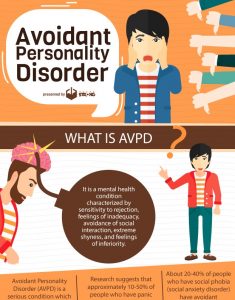What is Avoidant Personality Disorder?
Avoidant Personality Disorder (AVPD) is a mental health condition characterized by sensitivity to rejection, feelings of inadequacy, avoidance of social interaction, extreme shyness, and feelings of inferiority. It is a serious condition found to affect up to 6.4% of the general population.
In order to be diagnosed with AVPD, a person must meet at least 4 out the 7 following criteria:
- Avoids occupational activities that involve significant interpersonal contact, because of fears of criticism, disapproval, or rejection.
- Is unwilling to get involved with people unless certain of being liked.
- Shows restraint initiating intimate relationships because of the fear of being ashamed, ridiculed or rejected due to severe low self-worth.
- Is preoccupied with being criticized or rejected in social situations.
- Is inhibited in new interpersonal situations because of feelings of inadequacy.
- Views self as socially inept, personally unappealing, or inferior to others.
- Is unusually reluctant to take personal risks to engage in any new activities because they may prove embarrassing.
Is Avoidant Personality Disorder the same as Failure To Launch Syndrome?
While Failure to Launch is characterized as a young adult’s inability to thrive and be independent on his own, Avoidant Personality Disorder is expressed when someone attempts to avoid many of the relevant norms, responsibilities, and expectations of day to day life, rendering them unproductive and unmotivated to improve their situation.
Sometimes AVPD has been expressed as intense shyness. Individuals struggling with failure to launch exhibit the same avoidant tendencies but choose a more apathetic approach to life, showing little or no concern. To put it bluntly, failure to launch and AVPD are simply different fingers on the same hand.
Because of the strong corollary between failure to launch syndrome and avoidant personality disorder it can be extremely hard to tell one apart from the other. Many symptoms attach themselves to both disorders that cross over and can contribute to each. The simple fact is that these conditions or symptoms often express themselves together in a combination that contributes to the larger issue of failing to launch or AVPD. We refer to this as “co-occurrence”.
In fact, the anxiety that is associated with both disorders can be a result of one or many issues that manifest more broadly into an anxiety-based outcome. For example, General Anxiety Disorder, ADD/ADHD, Persistent Depressive Disorder can all greatly contribute to someone developing an avoidant personality disorder.
Paralleling this, individuals that fail to launch usually do so because of similar factors: ADD/ADHD, depression, video game addiction, etc…which thwart a person’s progress resulting in an unmotivated and unproductive lifestyle.
The main takeaway is that because these issues are so similar in nature, there is an effective method to treat and work with both issues, to lessen their effect and help individuals live a more motivated, productive and active life. Although this change can be difficult, Forte Strong has worked with young adults who have been able to improve their situation drastically from both Failure to Launch and AVPD and have gone on to lead more independent and fruitful lives as a result of our approach to treating these disorders.
If you feel that your son is stuck because of either of these issues, we would love to answer any questions you might have or help in any way that we can.
Download our “Signs of AVPD” infographic HERE to share if you know someone that is suffering from Avoidant Personality Disorder

